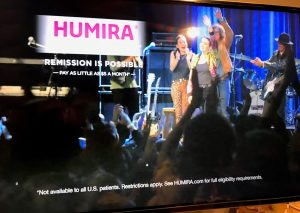With the world’s best-selling drug now facing direct biosimilar competition, AbbVie says it is confident its robust pipeline will deliver double-digit growth going forward.
In 2018, the first biosimilar versions of Humira (adalimumab) were launched in Europe and other non-US markets. Meanwhile in October, Sandoz became the third firm to receive US Food and Drug Administration (FDA) approval for a Humira biosimilar. It is, therefore, fair to say sales of the world’s top selling drug – Humira clocked in sales of $18.4 billion in 2017, and $15 billion for the first nine months of 2018 – are under threat.
But speaking at the 37th JP Morgan Healthcare Conference in San Francisco, Mike Severino, AbbVie’s vice chairman and president, said new product launches will offset any losses from biosimilar competition. “We expect revenue from our non-Humira growth platform, including our durable base business and innovative new products, will grow to more than $35 billion in 2025.”

A screenshot from a US televeision advertisement for Humira, the world’s top selling drug by revenue
He added direct biosimilar competition will have an impact of more than $6 billion in international Humira business, but AbbVie has “long been diligently planning for this event,” and is fully prepared.
“We are now facing direct biosimilar competition across the majority of international markets. And as I just outlined, we expect to drive strong growth despite its impact in 2019.” Numerous settlement agreements made over the past 12 months mean the firm does not anticipate direct biosimilar competition in the US until 2023.
New product launches
In fact the firm is aiming for double-digit growth in 2019 and beyond, driven by “significant investment” to support new product launches.
“As we enter this important time for our company, you will see the next stage of our strategy play out. We have built a tremendous growth platform in hematology/oncology with Imbruvica [ibrutinib] and Venclexta [venetoclax tablets], the leading mechanisms in this area. Combined, they will drive significant growth during this biosimilar period.”
For the nine months up to October 2018, Imbruvica pulled in global revenues of $1.9 billion. Venclexta is a first-in-class medicine that selectively binds and inhibits the B-cell lymphoma-2 (BCL-2) protein co-developed and commercialized by AbbVie and Roche. For the first nine months 2018, the drug pulled in $220 million.
While Severino said these will grow, he also highlighted two immunology assets, upadacitinib and risankizumab, which “have the potential to provide improved outcomes for patients across a number of indications and ultimately replace Humira as the leading immunology assets.”
The firm submitted a Biologics License Application (BLA) for risankizumab for moderate to severe plaque psoriasis in April 2018. In October, AbbVie said Phase III trials for upadacitinib in ulcerative colitis had been initiated.
Correction: The original article placed Humira sales for the first nine months of 2018 as $13.5 billion, rather than $15 billion, as reported by AbbVie.
